|
WILLIAM MALDON
WOODFULL,
OBE, BA, Dip Ed
A FAMOUS SON OF MALDON
Bill Woodfull is remembered for his cricketing
record and in particular his captaining of the
Australian Test Team during the infamous Australia v
England “Bodyline” series in 1932 - 1933.
His grandfather was a corn dealer in the Maldon
area; his father, Thomas Staines Brittingham
Woodfull, was born in Maldon on 28 August 1863 and
Bill was born in Maldon on Sunday, 22 August 1897 at
the Methodist Parsonage.
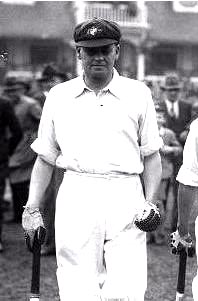 |
|
At the time of Bill’s birth his father was the
minister at the Maldon Methodist Church. In
1904 the Rev Woodfull moved to set up
Melbourne’s second Methodist Mission in Gipps
Street, Collingwood and it was here that Jim
Ryder laid a cricket pitch for the minister in
his back yard. Two boys, Bill Woodfull and
Jack Ryder, played on the pitch and both went
on to captain Australia.
Bill Woodfull took up teaching and was posted
to the country. On his return to Melbourne
his cricketing ability was
recognised and he was picked for the Victorian
team in1922. He was selected for the
Australian team in 1926, appointed captain in
1930 and retired from test cricket in 1934.
His calm temperament, determination, courage
and high moral principles made him one of
Australia's most respected and successful
captains. He captained Australia with dignity
and sportsmanship through a difficult period
in Australian cricket history.
|
On 11 August 1965, aged 68, Bill Woodfull collapsed
and died while playing golf at Tweed Heads South in
New South Wales.
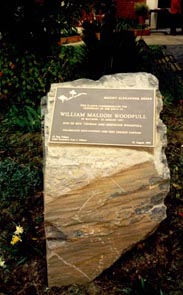 |
|
A memorial plaque in
Maldon in the grounds of the Methodist Church
and Parsonage where Bill Woodfull had been
born.
|
THE TEACHER
Bill Woodfull qualified as Bachelor of Arts with a
Diploma of Education and was posted to the country,
moving around the state until he achieved the top
position of Principal at Melbourne High School.
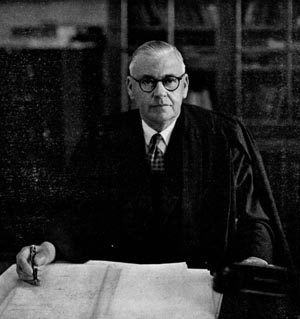 |
|
The High Schools where he taught include: |
Maryborough
Williamstown
Frankston
Melbourne
Bendigo
Upwey
Melbourne
Box Hill
Melbourne |
1920 - 1921
1922 - 1925
1926
1926 - 1940
1941 - 1942
1943 - 1947
1948 - 1953
1954 - 1955
1956 - 1962 |
Principal
Vice -Principal
Principal
Principal |
In November 1934 he declined a knighthood and in
later years revealed that he would have accepted the
honour as an educationalist, but under no
circumstances would he accept it for playing
cricket.
But in the New Year’s Honours list of 1963, he
received the OBE for his services to education.
THE CRICKETER
Bill Woodfull started playing for Essendon when he
was 19. Moving to Maryborough to teach. He played
country cricket and was selected for the Victorian
colts and then the Victorian Second XI. When he
returned to Melbourne in 1921 he played for South
Melbourne, was seen by the Victorian Sheffield
Shield Team selectors and selected for the 1922 -
1923 State team. He soon made his mark as a
middle-order batsman and was promoted to the top of
the order. This was the start of the successful long
time opening partnership with Bill Ponsford and in a
match against NSW in 1926 they scored a record 375.
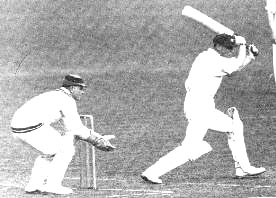 |
|
Rheumatic fever when he was young left him
with stiffness that restricted his back lift,
but his weight and strength let him score
through careful placement and occasional
strong drives, scoring runs at a greater rate
than most orthodox batsmen. His temperament,
patience, consistency and a seemingly
impregnable defence resulted in nicknames such
as “Worm-killer”, “Unbowlable”, “The Rock” and
“Old Steadfast”.
In 1926 Woodfull was the last man picked in
the Australian squad to tour England. He
didn’t bat in the first Test, struggled in the
middle-order in the second, but when he was
promoted to opener for the third he scored
141, then 117 in the fourth and was
Australia’s top scorer for the tour. |
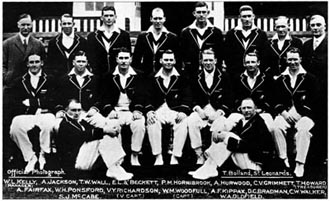 |
|
Bill Woodfull was
first appointed captain for the 1930 Australia
- England series played in England where the
team regained the Ashes.
Bill Woodfull went on to play 35 Tests and was
captain for 25 of them, including the infamous
“Bodyline” Tests in 1932 - 1933. For these 35
Tests he scored 2300 runs for an average of
46.0 with a highest score of 161. On the three
occasions he toured England he scored over
1000. He retired from cricket after the
Australia - England Fifth Test at The Oval in
1934. |
During his first class cricketing career which
spanned fifteen years, he batted in 245 innings,
scored 13,388 runs with an average of 65 and a
highest score of 284.
| The date, August 22, featured in his life: |
| |
22 August 1845:
|
Surrey County Cricket Club was
formed on this day - the club of Douglas Jardine
who captained the “Bodyline” series.
|
| |
22 August 1897: |
Bill Woodfull was born on this day. |
| |
22 August 1930: |
Australia regained the Ashes on
this day with Woodfull as captain, after Australia
had lost the Ashes in the 1926 series in England. |
| |
22 August 1934: |
Australia regained the Ashes on
this day with Woodfull as captain, after Australia
had lost the Ashes in the 1932 - 1933 “Bodyline”
series. |
The gate in the Great Southern Stand
at the MCG was dedicated as the Bill Woodfull
Gate in 1992
BODYLINE SERIES
“There are two teams out there, one is playing
cricket.
The other is making no attempt to do so.”
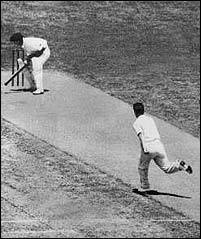 |
|
These were the words
reportedly spoken by Bill Woodfull during the
Adelaide Test of the 1932 - 1933 series, known
as the “Bodyline” series.
The “Bodyline” series was reportedly a result
of Don Bradman’s successful 1929 - 1930 Test
series in England. The way Bradman was batting
the MCC could see it losing the Ashes for the
next ten years. Even though Bradman had batted
so spectacularly well it was felt that he did
not play short-pitched deliveries confidently.
A meeting attended by Douglas Jardine, Arthur
Carr, Harold Larwood and Bill Voce was held at
the Piccadilly Hotel in London in August 1932
and tactics to restrict Bradman during the
coming tour of Australia were discussed. The
plan was devised to use the two opening fast
bowlers Harold Larwood and Bill Voce and apply
a form of the “Fast Leg Theory” successfully
used by Carr in County cricket. The tactic
devised was to pack the leg side field and
then bowl at the batsman. The result was that
the batsman had to choose to either take
evasive action or attempt to fend the ball
away, possibly giving catching chances to the
close set leg side field. Jardine later
indicated that the plan had been discussed
with the MCC and had their agreement prior to
the team’s departure. |
Australia lost the First Test in Sydney with the
“Bodyline” attack contributing to the defeat. Bill
Woodfull refused to consider retaliation under any
circumstances.
Bradman had been out with the ‘flu for the First
Test, in the Second Test in Melbourne Bradman was
bowled for a duck in the first innings but scored
103 in the second innings, helping Australia win by
111 runs and it was thought that the Australian
batsmen could handle England’s bowling strategy.
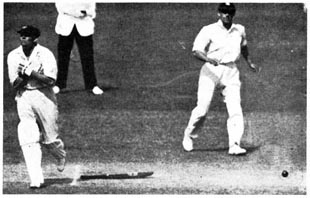 |
|
The third test was played in Adelaide to a hostile
crowd and by this time there had been private moves
by Bradman to get the Australian cricket authorities
to object to the MCC. Bill Woodfull was hit over the
heart by a ball from Larwood and retired to the side of
the field and Jardine was heard to say to Larwood
“Well bowled, Harold”. When Woodfull recovered and
returned to the crease, Jardine set the “Bodyline”
field and the crowd became even more hostile and
were thought to be on the verge of rioting. Bill
Woodfull, even though pale and shaky, went on to
make 73 runs not out. Later in the match Bill
Oldfield was hit in the head resulting in a
fractured skull. |
The England team manager Sir Pelham "Plum" Warner
and the assistant manager came to the dressing room
after the game to see the state of Woodfull’s injury
and it was then that he made the famous statement
“There are two teams out there, one is playing
cricket. The other is making no attempt to do so.
This sort of thing is ruining the game, which is too
good to be spoiled, and it is time some men got out
of it”. The comment was leaked to the newspapers and
caused an international incident. The Australian
cricket authorities cabled the MCC requesting that
they instruct the England team to stop using the
unsportsmanlike “Bodyline” tactics. The MCC refused
to instruct the England team and threatened to
recall them. The discussions were then taken up at
diplomatic and government levels to calm down the
situation. England went on to win the Third Test,
753 runs to Australia’s 415, with Bill Woodfull
scoring a 22 and 73 not out.
During the Third Test England’s bowler “Gubby” Allen
was handed the ball and when Jardine started to pack
the leg-side, Allen seeing the field being set,
threw the ball back to Jardine and told him: “I am
not bowling to this field, Douglas, and remember you
cannot push me around.”.
In the Fifth Test in Sydney Larwood broke a bone in
his foot, but Jardine made him complete the over.
Larwood stood stationary at the wicket and bowled
and Bill Woodfull, the true sportsman, refused to
take advantage of the injured bowler and blocked the
remaining deliveries back down the wicket.
The series ended with England winning 4 to 1.
Bill Woodfull ended the series scoring a total of 43
runs in the first two Tests, but his determination
in the remaining three Tests resulted in innings of
73 not out, 67 and 67.
Following the series: Jardine did not play in the
1934 series and was said to have felt let down by
the MCC leaving him to take all the blame for the
“Bodyline” series; Larwood refused to apologise for
his bowling and also refused to sign a letter of
apology; Larwood refused to play Test cricket again
and later moved to Australia; The Australian team
only agreed to the 1934 series if the MCC assured
them that there would not be a continuation of
“Bodyline” bowling; Bill Woodfull was said to have
taken a heavy emotional toll during the
“Bodyline”series and lost his desire to play
cricket, he retired at the end of the 1934 series
after captaining the team that won back the Ashes,
winning 2 to 1.
|